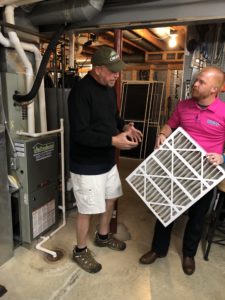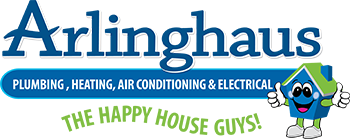As fall ushers in cooler weather, we’ll spend more time in our homes. We often think the air in our homes is cleaner than the air outside, but that’s not always the case. The Environmental Protection Agency estimates that indoor air environments can be two to five times worse than outdoor air.
Don’t fear – we have tips to help you improve the air quality in your home:
- Keep things clean – While we keep our windows closed through the summer to ensure heat stays out, mold, dust, dander and other allergens can build up inside the home. At the end of each season, it’s a great idea to do a thorough cleaning of any material-based items in your home; this includes – but is not limited to – curtains, throw pillows and blankets, pet beds, and bed linens. If you have carpet in your home, having a professional cleaning performed a couple of times a year is also a great idea.Scheduling annual maintenance for your heating and cooling system also ensures that clean air is circulating through your home. Technicians will clean built up dust and dirt from the neglected areas of your system and clean out or replace your air filter, which will improve the air quality in your home.
- Improve ventilation – Proper ventilation can also improve indoor air quality in your home.
 Most heating and cooling systems, including forced air heating systems, do not bring fresh air into the house. When weather permits, opening windows and doors with screens, running window or attic fans, or running a window air conditioner with the vent control open increases the ventilation rate by allowing outdoor air to circulate into your home. Also, it can be beneficial to use exhaust fans or open windows to ventilate rooms in your home that tend to hold extra moisture, such as bathrooms.
Most heating and cooling systems, including forced air heating systems, do not bring fresh air into the house. When weather permits, opening windows and doors with screens, running window or attic fans, or running a window air conditioner with the vent control open increases the ventilation rate by allowing outdoor air to circulate into your home. Also, it can be beneficial to use exhaust fans or open windows to ventilate rooms in your home that tend to hold extra moisture, such as bathrooms.
- Improve ventilation – Proper ventilation can also improve indoor air quality in your home.
- Install air cleaners – Your heating and cooling system moves about 1.5 million cubic-feet of air around your home every day, which makes it the perfect place to address indoor air quality challenges. With the installation of a whole-house air cleaning system that cleans, disinfects and deodorizes your home 24-hours a day, you’ll get cleaner air, better sleep, and allergens that can cause allergy or asthma issues. A media or electronic air cleaner is up to 85% more efficient at capturing both microscopic particles, like dust and smoke, and larger contaminants such as mold spores and pet dander. Highly efficient air cleaners also require minimal maintenance and are more effective than a unit designed for use in individual rooms. They can also help protect your HVAC system and extend equipment life.
- Invest in house plants – In addition to serving as home décor and mood boosters, plants are
 incredibly important to human life. Through photosynthesis they convert carbon monoxide into fresh oxygen. Studies have shown that they can also remove toxins, such as formaldehyde and benzene, from the air in your home.A NASA study also found that soil microorganisms in potted plants could even help improve indoor air quality. Because of this, many experts believe that houseplants can serve as natural indoor air purifiers. Some recommended plants include Boston ferns, palm trees, rubber plants and Janet Craigs, English ivy, and golden pothos. All require little upkeep and look great in homes!
incredibly important to human life. Through photosynthesis they convert carbon monoxide into fresh oxygen. Studies have shown that they can also remove toxins, such as formaldehyde and benzene, from the air in your home.A NASA study also found that soil microorganisms in potted plants could even help improve indoor air quality. Because of this, many experts believe that houseplants can serve as natural indoor air purifiers. Some recommended plants include Boston ferns, palm trees, rubber plants and Janet Craigs, English ivy, and golden pothos. All require little upkeep and look great in homes!
- Invest in house plants – In addition to serving as home décor and mood boosters, plants are
- Monitor and manage humidity – Balancing the humidity levels in your home is a very simple and important thing to do. Not enough moisture in the air can cause health issues, damage your home and cost you more money, especially in the wintertime. Whole-house humidifiers work hand-in-hand with your existing heating and cooling system to add humidity into the air and will greatly benefit you and your family. Having too much moisture in the air can cause mold and mildew to grow in wet areas and attract unwanted insects and other creatures into your home. A whole-home dehumidifier can be free-standing or installed as part of your home’s heating and cooling system to automatically remove the right amount of humidity from every room and maintain optimal indoor relative humidity.
Following these tips can help you improve indoor air quality to prevent mold, reduce allergens and improve sleep conditions. Learn how your HVAC can help you sleep better. It can also help to ensure that you and your family are happy and healthy through the cooler months ahead. Contact Arlinghaus Plumbing, Heating & Air Conditioning today to learn more about available air quality products, such as whole-home humidifiers, UV filtration systems, air purifiers and more.

